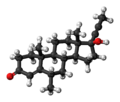Dimethisterone
Dimethisterone is a synthetic progestogen that belongs to the group of medications known as progestins. It is a derivative of testosterone, specifically a 17α-ethylated derivative of testosterone, which was developed in the 1950s and has been used in a variety of clinical applications. Dimethisterone has been utilized in the treatment of gynecological disorders, as a component of menopausal hormone therapy, and in some formulations of oral contraceptives. Despite its historical usage, it is less commonly used today, with other progestins being preferred for most therapeutic applications.
Medical Uses[edit]
Dimethisterone has been used in the treatment of various gynecological conditions, including endometriosis, amenorrhea, and to counteract the effects of estrogen in hormone replacement therapy, particularly in menopausal women. It has also been used in the past as a component of some oral contraceptive pills. However, its use in current medical practice is limited due to the availability of newer progestins with better efficacy and safety profiles.
Pharmacology[edit]
Mechanism of Action[edit]
As a progestin, dimethisterone acts by mimicking the effects of the natural hormone progesterone. It binds to and activates progesterone receptors in various tissues throughout the body, leading to a range of effects including suppression of ovulation, changes in the endometrium that prevent implantation of a fertilized egg, and thickening of the cervical mucus to inhibit sperm penetration.
Pharmacokinetics[edit]
The pharmacokinetic properties of dimethisterone, such as its absorption, distribution, metabolism, and excretion, are not well-documented in the current literature. Like other orally active progestins, it is assumed to undergo extensive first-pass metabolism in the liver.
Adverse Effects[edit]
The adverse effects of dimethisterone are similar to those of other progestins and may include nausea, headache, breast tenderness, and mood changes. Long-term use of progestins has been associated with an increased risk of certain conditions, such as cardiovascular disease and breast cancer, although the risk varies depending on the specific progestin and the patient's overall health profile.
History[edit]
Dimethisterone was developed in the 1950s as one of the first synthetic progestins. Its development marked a significant advancement in the field of hormonal contraception and hormone replacement therapy. Despite its historical significance, the use of dimethisterone has declined over the years in favor of newer, more effective progestins.
Society and Culture[edit]
The introduction of dimethisterone and other synthetic progestins had a profound impact on women's health, offering new options for contraception and the management of gynecological disorders. However, the use of dimethisterone has decreased over time due to the development of newer medications with improved safety and efficacy profiles.
-
Dimethisterone
-
Dimethisterone 3D ball
Ad. Transform your life with W8MD's Budget GLP-1 injections from $75


W8MD offers a medical weight loss program to lose weight in Philadelphia. Our physician-supervised medical weight loss provides:
- Weight loss injections in NYC (generic and brand names):
- Zepbound / Mounjaro, Wegovy / Ozempic, Saxenda
- Most insurances accepted or discounted self-pay rates. We will obtain insurance prior authorizations if needed.
- Generic GLP1 weight loss injections from $75 for the starting dose.
- Also offer prescription weight loss medications including Phentermine, Qsymia, Diethylpropion, Contrave etc.
NYC weight loss doctor appointmentsNYC weight loss doctor appointments
Start your NYC weight loss journey today at our NYC medical weight loss and Philadelphia medical weight loss clinics.
- Call 718-946-5500 to lose weight in NYC or for medical weight loss in Philadelphia 215-676-2334.
- Tags:NYC medical weight loss, Philadelphia lose weight Zepbound NYC, Budget GLP1 weight loss injections, Wegovy Philadelphia, Wegovy NYC, Philadelphia medical weight loss, Brookly weight loss and Wegovy NYC
|
WikiMD's Wellness Encyclopedia |
| Let Food Be Thy Medicine Medicine Thy Food - Hippocrates |
Medical Disclaimer: WikiMD is not a substitute for professional medical advice. The information on WikiMD is provided as an information resource only, may be incorrect, outdated or misleading, and is not to be used or relied on for any diagnostic or treatment purposes. Please consult your health care provider before making any healthcare decisions or for guidance about a specific medical condition. WikiMD expressly disclaims responsibility, and shall have no liability, for any damages, loss, injury, or liability whatsoever suffered as a result of your reliance on the information contained in this site. By visiting this site you agree to the foregoing terms and conditions, which may from time to time be changed or supplemented by WikiMD. If you do not agree to the foregoing terms and conditions, you should not enter or use this site. See full disclaimer.
Credits:Most images are courtesy of Wikimedia commons, and templates, categories Wikipedia, licensed under CC BY SA or similar.
Translate this page: - East Asian
中文,
日本,
한국어,
South Asian
हिन्दी,
தமிழ்,
తెలుగు,
Urdu,
ಕನ್ನಡ,
Southeast Asian
Indonesian,
Vietnamese,
Thai,
မြန်မာဘာသာ,
বাংলা
European
español,
Deutsch,
français,
Greek,
português do Brasil,
polski,
română,
русский,
Nederlands,
norsk,
svenska,
suomi,
Italian
Middle Eastern & African
عربى,
Turkish,
Persian,
Hebrew,
Afrikaans,
isiZulu,
Kiswahili,
Other
Bulgarian,
Hungarian,
Czech,
Swedish,
മലയാളം,
मराठी,
ਪੰਜਾਬੀ,
ગુજરાતી,
Portuguese,
Ukrainian


